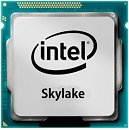Tuesday, February 9th 2016

Intel Pushes CPU Microcode Update which Cripples Overclocking Non-K Skylake CPUs
Intel pushed a CPU microcode update to its motherboard partners, which "plugs a loophole," which allowed people to overclock Core "Skylake" processors, other than those with the "K" brand extensions. The PC enthusiast community rejoiced what it felt was a comeback of base-clock overclocking on non-enthusiast Intel chips, with the advent of the company's 6th generation Core "Skylake" architecture. Apparently, Intel sees it as a flawed CPU micro-code which allowed overclocking, and which some motherboard vendors even built marketing campaigns around.
In an interview with PC World, a company spokesperson stated: "Intel regularly issues updates for our processors which our partners voluntarily incorporate into their BIOS," an Intel spokesman said. "The latest update provided to partners includes, among other things, code that aligns with the position that we do not recommend overclocking processors that have not been designed to do so. Additionally, Intel does not warranty the operation of the processor beyond its specifications." So how does this micro-code update work? For starters, it will work only if you want it to. If your motherboard currently supports overclocking, then it will continue to do so, until you update its BIOS. Intel will push the new micro-code to its motherboard partners, who in turn will deploy it on their latest production batches, and to their customers through DIY BIOS updates.
Source:
PC World
In an interview with PC World, a company spokesperson stated: "Intel regularly issues updates for our processors which our partners voluntarily incorporate into their BIOS," an Intel spokesman said. "The latest update provided to partners includes, among other things, code that aligns with the position that we do not recommend overclocking processors that have not been designed to do so. Additionally, Intel does not warranty the operation of the processor beyond its specifications." So how does this micro-code update work? For starters, it will work only if you want it to. If your motherboard currently supports overclocking, then it will continue to do so, until you update its BIOS. Intel will push the new micro-code to its motherboard partners, who in turn will deploy it on their latest production batches, and to their customers through DIY BIOS updates.

49 Comments on Intel Pushes CPU Microcode Update which Cripples Overclocking Non-K Skylake CPUs
That micro-code update was included in Windows Updates, which caused overclockers using the Pentium G3258 to suddenly receive a BSOD on startup for no clear reason (and on some occasions, like mine, it caused a BSOD even without overclocking). Had I known that Intel likes suddenly wrecking customers' PCs like that, I would've went with some AMD APU instead.
I wonder if Intel will push this microcode update through Windows updates as well.
Everyone who bought a non K Intel CPU after hearing that they can be unlock, will be very happy with this decision. But I guess it is no big deal if the BIOS that permits OC is nice and stable and there is no reason to update it.
bugger all to do with how well any chip can perform at.. simply what intel says it can perform at whatever price intel sells it to perform at.. the only surprise is that they let the base clocking trick out of the bag in the first place..
a whole bunch of identical chips in different boxes all with different prices and different (intel set) clock speeds.. its been this way for years.. nothing much has changed..
trog
I have lost faith in Intel when it comes to overclocking friendlyness
answers.microsoft.com/en-us/windows/forum/windows_10-windows_install/windows-10-upgrade-fails-with-0xc1900101-0x20017/db224756-027e-4a5c-83a8-0c8edd156e55?auth=1
Interestingly, turbo boost isn't supported, but it sure works on my 3rd rig. Multiplier and voltage goes up and down with load. ark.intel.com/products/82723/Intel-Pentium-Processor-G3258-3M-Cache-3_20-GHz
Back in the day, you could get a cheap $200 CPU and make it work like a $500+ part. And that was when every MHz mattered.
Today, CPUs are already overkill for desktop usage and an overclocked CPU won't be felt under >80% of your daily usage (and it can overclock itself some anyway). I have a k CPU and I had one before. I overclocked the first one to see how fast it would go, but then for several years I have used it at stock speeds. The current CPU, I wasn't even interested in seeing what it can do.
Oh and btw, when overclocking was born, it wasn't sanctioned by intel either. It just wasn't actively sabotaged.
If it becomes a problem, the only thing this will do is annoy those who chose the cheaper route instead of saving or spending more on the unlocked variations. Hopefully they just keep it at the bios level but I am not holding my breath.
Oddly enough I haven't see many people buying i5 6400 and overclocking them which would 70$ cheaper than buying a 6600K and overclocking.
2. ?
3. Profit
Though this works only existing MB's/CPU's.
I don't think there's any coincidence they released this chip in 2016, since 20 years earlier in 1996, this:Source: www.techradar.com/us/news/computing-components/processors/need-for-speed-a-history-of-overclocking-540671
Who doesn't remember the buzz of the Celeron 300 A, capable of 450Mhz? Arguably, we wouldn't even be here on TPU if that chip wasn't released!
I wish they'd release a K series i3, but that would hurt their sales of their higher processors.I'm pretty sure Intel's marketing slides touted the unlocked multiplier.
Like this one:
www.legitreviews.com/wp-content/uploads/2014/06/pentium-anniversary-cpu-645x392.jpg
now without adequate competition they get in on the action too.